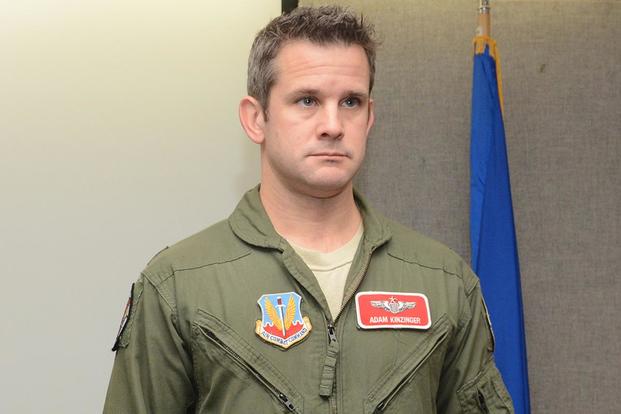A U.S. lawmaker who recently deployed to the southern border as a guardsman is within his rights to be critical of his direct chain-of-command even as officials weigh disciplinary action, according to his spokeswoman.
Rep. Adam Kinzinger, R-Illinois, earlier this week criticized Wisconsin Gov. Tony Evers for withdrawing the state's troops from the southern border.
As a result, Kinzinger, who serves as an RC-26 pilot with the Wisconsin Air National Guard's 115th Fighter Wing, may face administrative action from the state adjutant general, to whom the Guard answers, for his comments, WISN 12 News reported Tuesday.
Kinzinger deployed with his unit to the border for the security mission earlier this month.
"Your guardsmen saved many lives and protected our country on this mission," he posted on Twitter on Monday.
Related content:
- Deployed Lawmaker Fights Air National Guard's Effort to Shrink Spy Plane Fleet
- After Deployment to US Border, Congressman Backs Trump's Emergency Declaration
- 'No Military Threat' at Southern Border, Key General Tells Lawmakers
"I'm grateful to my fellow Wisconsin Guard members, and I'm deeply disappointed you won't let them do what they are trained to do for the good of the country," Kinzinger wrote. "@GovEvers, I hope you'll reconsider."
The intelligence, surveillance and reconnaissance pilot also questioned whether withdrawing the troops was "based solely on politics."
Kinzinger's spokeswoman defended his right to speak out. "The Congressman is off-duty and has the right to exercise his freedom of speech as he so chooses, just as he has done when critical of the current president and the president before him," Maura Gillespie told Military.com in a statement.
"The implication that a member of the National Guard cannot speak freely when off-duty is just absurd, and not in accordance with the [Uniform Code of Military Justice] law nor Wisconsin law, which clearly states these restrictions only apply to members on service," she said.
The Wisconsin Guard is "looking into the matter," spokesman Capt. Joe Trovato said.
When the Guard will reach a conclusion on potential disciplinary action "remains undetermined," Trovato said during a phone call. "As a matter of organizational policy, we don't typically comment on [these] matters."
Kinzinger, a lieutenant colonel, said his two-week deployment opened his eyes to what the border mission means to the U.S., adding that more resources should be devoted to the effort.
He told CBS' "Face the Nation" on Sunday that he agrees the border situation "is a security threat" and he will not oppose President Donald Trump’s national emergency declaration.
"It's a security threat with the amount of drugs coming over the border and the human trafficking that I've seen," Kinzinger said during the interview.
Law experts have questioned whether a military member, even retired, may speak out against superiors, and whether they would be subject to UCMJ disciplinary action.
According to the Lawfare Blog, "contemptuous speech" is prohibited by Article 88 of the UCMJ.
It criminalizes "contemptuous words against the President, the Vice President, Congress, the Secretary of Defense, the Secretary of a military department, the Secretary of Homeland Security, or the Governor or legislature of any State," Lawfare's Rick Houghton, an Army veteran, wrote of the provision.
Article 134 of the UCMJ speaks to "the prejudice of good order and discipline in the armed forces," and any "conduct of a nature that brings discredit upon the armed forces."
In this case, any reprimand would come from the adjutant general of Wisconsin, although such action is rare, a military source said on background.
Kinzinger has also taken a personal interest in the RC-26 aerial surveillance plane, which he flies.
Military.com recently learned that the Air National Guard may be looking to get rid of at least half of its older RC-26 fleet in coming years, even though some are still being upgraded.
Kinzinger spoke out against the plan, entering the discourse as both a policymaker and a guardsman. In an Op-Ed in Air Force Times last month, he said divesting the aircraft at a time when border security needs to be a top priority for the nation would be a mistake.
His spokeswoman said then that Kinzinger stands by his overall arguments for additional resources for border security.
"As the congressman has said before, he believes we need stronger border security, and that includes having additional military personnel on the ground to handle the illegal activity on the border, but also to help facilitate activity through the points of entry and people coming into the country," Gillespie said before Kinzinger's deployment the week of Feb. 11.
Kinzinger was commissioned in the Air Force in 2003, according to Air Force Magazine.
He first flew KC-135 Stratotankers before switching to the RC-26, and deployed several times for missions in Iraq and Afghanistan.
-- Oriana Pawlyk can be reached at oriana.pawlyk@military.com. Follow her on Twitter at @Oriana0214.












